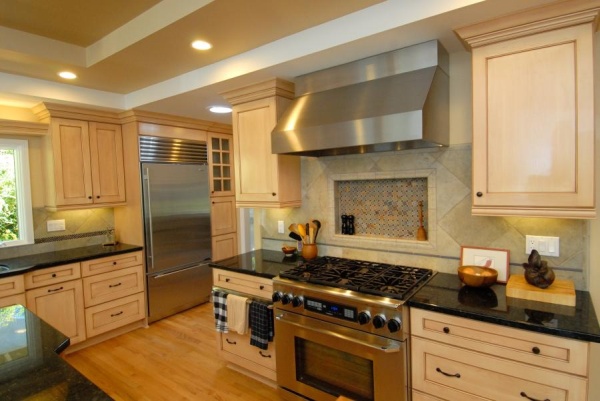
When it comes to kitchen remodeling, one aspect that’s sometimes overlooked is the energy efficiency of kitchen appliances. Photo: American Ratings Corporation (2015)
When planning to remodel their kitchens, many homeowners focus on improving aspects such as visual aesthetics and functional utility. However, a kitchen remodel also provides a great opportunity to improve energy efficiency, primarily through updating appliances like refrigerators and ovens with new, environmentally-friendly models. By minimizing energy consumption, updating your kitchen appliances will reduce both your carbon footprint and monthly power bills, which is a true win-win situation. Here are some things to look for when selecting new appliances:
Refrigerators
- Refrigerator efficiency has improved significantly over the past decade, but refrigerators still consume more energy than any other kitchen appliance. If you purchase a new refrigerator as part of your remodel, consider an Energy Star model.
- Keep in mind that extra features like ice dispensers reduce a refrigerator’s efficiency. Likewise, refrigerators that have freezer compartments on the side are less efficient than models with the freezer door above the refrigerator door.
- Avoid placing your refrigerator close to heat sources such as the stove or microwave. Even heat ducts and bright sunlight will reduce the refrigerator’s efficiency.
- Keeping your old refrigerator for extra food storage may seem like a good idea, but it will only increase your energy bill. Instead, purchase a slightly larger refrigerator that will accommodate your needs. Never take your old refrigerator to a landfill—it could leach harmful pollutants into the groundwater.
Dishwashers
- Dishwashers use the most energy when they heat water during a wash cycle, so look for a model that allows you to adjust the water temperature. To save even more energy, turn the heat setting off and air dry your dishes.
- Install your dishwasher at a maximum distance from your refrigerator. If it’s too close, its heat and moisture will make the refrigerator work harder and increase energy costs. If you have to put them next to each other, separate them with a sheet of foam insulation.
Stoves or cooktops
- Gas stoves generally use less energy than electric stoves, but if your home has a renewable energy source, an electric range may be preferable. In either case, make sure you have a good ventilating range hood (exhaust fan) that matches the size and capacity of the stove or cooktop to effectively remove cooking and combustion byproducts from the kitchen.
- Consider a convection oven—they speed up the cooking process and consume 30 to 50 percent less energy than regular ovens. To save even more energy, look for ways to match the task with the cooking method, such as making use of slow cookers and toaster ovens.
Find a Diamond Certified company in your area
